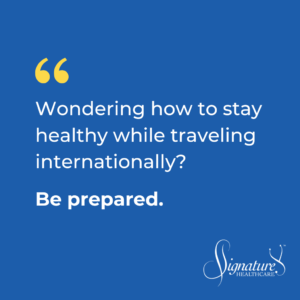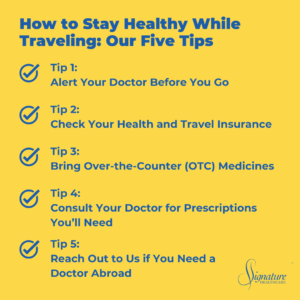How to Stay Healthy While Traveling: Five Tips From a Physician
Traveling the globe is a great way to broaden your horizons. Visiting a new country expands your worldview and gives you great stories and cherished memories.
But there is an occasional downside to international travel. Suppose you suffer from an accident, illness, or other health issue outside your normal environment and without your usual support network. In that case, even a minor issue can become major — especially if you don’t speak the local language.
Some common examples:
- Travelers often develop upset stomachs and diarrhea, whether from drinking untreated water or eating contaminated or undercooked food.
- Being in close quarters on planes, boats, or buses can often lead travelers to contract respiratory tract infections. On some trips or cruises, travelers may have to isolate themselves in their staterooms when this happens.
- Accidents happen! People trip on cobblestoned streets, get hit by baggage in the overhead bin, or injure themselves when carrying heavy luggage. When this occurs, patients may have to have imaging done or see a specialist.
Wondering how to stay healthy while traveling internationally? Be prepared. Set yourself up for success on your trip with our essential tips.

How to Stay Healthy While Traveling: Our Five Tips
Tip 1: Alert Your Doctor Before You Go
Inform your concierge physician about your itinerary at least one month before your travel date, particularly if you’re traveling to a more exotic locale — Asia, most of Africa, or portions of South America.
Many countries on these continents require travelers to get a yellow fever vaccine. Depending on the locale, we may also advise shots against diseases like typhoid or hepatitis, which can cause diarrheal illnesses.
By planning ahead and providing your Signature Healthcare doctor with a complete list of the locales you’ll visit, you give us time to:
- Organize and arrange any vaccines you need. Ideally, we complete your recommended shots at least two weeks before you travel, allowing time for immunity to build. If you travel to the same locale regularly, you may not need repeated doses of some vaccines. Your doctor will advise you of the necessary frequency.
- Provide you with any preventive medications before you go — for example, a protective dose against malaria. Malaria resists different antibiotics in different parts of the world, and the medicine we use to treat someone traveling to Vietnam might differ from the medicine we use for a traveler to sub-Saharan Africa. I use a special service to determine appropriate prescriptions for each region. (I also advise you on any current travel alerts for the area you’re about to visit.)
Tip 2: Check Your Health and Travel Insurance
Before traveling internationally, consult your health insurer about your travel plans. Often, insurance policies won’t cover treatment in a foreign nation. If they do, you may incur a steep deductible and out-of-pocket maximum.
Consider purchasing an all-inclusive policy from a well-known, reputable travel insurance provider. An ideal policy covers not just trip cancellations and lost luggage but also doctor’s visits, hospitalization, and even a medical flight home.
The policy’s cost typically depends on the traveler’s age, but it can be reasonable — and worth it for the peace of mind you’ll have on your trip. (This excellent tool from Forbes can help you find appropriate travel coverage.)
Tip 3: Bring Over-the-Counter (OTC) Medicines
Following this “how to stay healthy while traveling” tip is as easy as visiting your local pharmacy. Pack your travel bag with these simple OTC medicines:
- An anti-diarrheal: Carry generic loperamide (or brand name Imodium) or a travel pack of Pepto-Bismol tablets in case diarrhea strikes.
- Mild pain reliever: Dragging luggage through unfamiliar locales can lead to pulled muscles or other aches. Bring some Advil or Aleve, and Tylenol if you use it regularly. A light pain reliever may help avoid time lost recuperating in your hotel room.Travel pointer: Medicines go by different names in different countries. If you search for Tylenol in certain parts of the world, you won’t find it; if you look for paracetamol, you will. If a patient calls me to say, “I’m in Scotland; what do I take here?” I can recommend local brand-name OTC products.
- Cold medicine: Ever since COVID impacted the world, I advise travelers to keep cold medicine on hand. It can be especially convenient in a locale where you don’t speak the language, where your usual medication might be hard (even impossible) to find, or when you can’t use medicines with ingredients like pseudoephedrine or phenylephrine.
- Digestive aids: When we travel, we often try foods we’re not accustomed to, consume spicy meals, or just eat more than we usually would. (After all, we’re on vacation!) A small roll of simple antacids like Rolaids or Tums, easily stashed in a toiletry kit, is a good idea for people prone to reflux. Generic famotidine, a histamine-2 blocker (brand name Pepcid AC), is an even better choice for travelers who regularly experience reflux at home.
- Hand sanitizer: Bring hand sanitizer and keep it easy to reach in an outer pocket or clipped to a bag.Travel pointer: If you’ve been grasping a grimy railing while riding the metro in Paris, don’t rely on hand sanitizer alone! Hand sanitizer doesn’t kill all germs, particularly resilient ones like norovirus. Make every effort to wash your hands before meals, then minimize handling anything else before you touch your food.
Tip 4: Consult Your Doctor for Prescriptions You’ll Need
Before you travel, refill any prescriptions you take regularly. Have a few extra days’ worth in case a flight is canceled or plans change.
Travel pointer: Rather than arrange pills in a pill sorter, bring medications in their prescription-labeled bottles or packaging so customs officials can see what you’re carrying. Add pills to the sorter when you’ve arrived at your destination.
Also, ask your physician about any prescription medication you may need to handle specific situations overseas. For instance:
- Motion sickness: If you’re sensitive to motion sickness, Dramamine is a good OTC alternative, but I’ll often prescribe scopolamine patches, applied every three days.
- Nausea: A prescription nausea medicine like Zofran (ondansetron) is available in tablets that dissolve in your mouth, so if you’re already sick, you can easily absorb them. Although these tablets don’t prevent seasickness, they’ll settle your stomach and help you fight other sources of nausea and vomiting (like a gastrointestinal bug picked up on a cruise).
- Traveler’s diarrhea: Treatment with OTC products may not be effective enough for issues that occur in more exotic locations. I prescribe azithromycin as an antibiotic for diarrhea, perhaps due to a stomach bug. It’s the same azithromycin used in a Z-Pak, but with a dosage targeted specifically at traveler’s diarrhea.
- Sleep: Skipping time zones can be challenging for your sleep cycles. A few days before travel, start syncing your body to the time zone you’re visiting. When you board your flight, adapt to the time at your destination. For example, if it’s midnight where you’re traveling, get right to sleep on the plane.For patients traveling to different time zones, I may prescribe a sleep aid — Ambien, Lunesta, perhaps Xanax — to relieve flight-related anxiety or difficulty sleeping on flights. A medication like Ambien helps reinforce your sleep schedule when you arrive in a new time zone.Travel pointer: Try out the sleep aid before your travel date. If you have an adverse reaction, we’ll find an alternative before you fly. And don’t consume alcohol with your sleep medication! I don’t want any of my patients to wind up on the no-fly list or go viral because of a medication I prescribed!When you arrive at your destination, avoid immediately taking a nap. Try to remain awake until bedtime locally.
- Specific health conditions: We’re especially sensitive to the needs of travelers with chronic health conditions or a tendency for flare-ups. If a traveler will be on a cruise ship or visiting a region potentially short of specialized medicines, we advise they carry necessary prescriptions in their personal luggage.For a patient prone to back pain, I might provide a corticosteroid dose pack in case pain flares while they’re away. If travel is likely to exacerbate a patient’s COPD, I may prescribe a travel pack of steroids and antibiotics. If someone reaches out to me from a cruise to tell me they’re wheezing or having a flare-up, I tell them it’s time to pull out those prescription medicines.
Tip 5: Reach Out to Us if You Need a Doctor Abroad
Signature Healthcare is a member of ROAMD, an elite network of concierge physicians in major cities worldwide. If you become ill while traveling, reach out. I may be able to help coordinate and refer you to a doctor at a ROAMD location.
I could certainly forward a prescription as needed, but a pharmacist in another country may not honor it. If you consult a physician from the ROAMD network, you’ll pay their fees, but you’ll be able to see a physician promptly who can issue you any needed prescriptions.

Final Thoughts on How to Stay Healthy While Traveling
Got questions on how to stay healthy while traveling the world? We’ve got your back (and your queasy stomach and your achy knees).
Fill us in on your trip plans, and we’ll advise you on everything you need to feel good and thoroughly enjoy your travels. (We’d also love to hear about the trip when you return!)

Dr. David Yancey
Dr. Yancey, a board-certified internal medicine specialist, hails from Winston-Salem and holds a psychology degree from Davidson College. He furthered his medical education at The Brody School of Medicine at East Carolina and completed his internal medicine residency at the prestigious Mayo Clinic. Returning to North Carolina in 2010, Dr. Yancey has since been a dedicated hospitalist physician at Carolinas Medical Center in Charlotte. There, he has spearheaded various multi-disciplinary rounding programs and contributed to the training of PA and nurse practitioner fellows.
Outside of his professional pursuits, Dr. Yancey is an avid enthusiast of the great outdoors, enjoying trail running and hiking with his dog. He also relishes traveling, cooking, and assembling jigsaw puzzles with his family.
Get the latest News
Join the Signature Healthcare Newsletter to get the latest articles, resources, and news delivered directly to your inbox.

